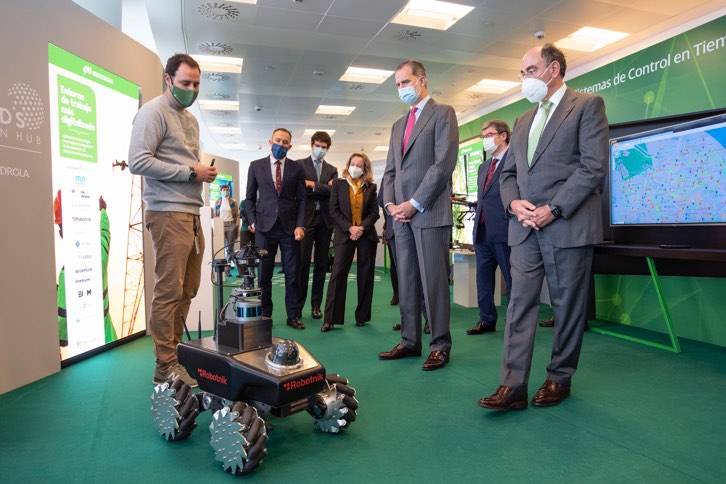News
-
01/12/2021Iberdrola, winner of the FEMUR "Men for equality" awards The Federation of Rural Women, FEMUR, a pioneering and benchmark organisation in the defence and promotion of rural women, today presented the FEMUR "Men for Equality" Awards at a gala event held at the Juan Bravo Theatre in Segovia. These awards recognise and make visible the promotion and encouragement of people or entities, institutions and companies in defence of equality between rural women and men in Spain, and in this first edition have been supported by the Directorate-General for Women of the Junta de Castilla y León. These national awards recognised three categories: company, NGO and individual. In the category for the promotion and encouragement of equality for companies, Iberdrola received the award for its work in implementing a policy of equal opportunity and work-life balance. The award was collected by the institutional delegate of Iberdrola in Castilla y León, Miguel Calvo, who gave thanks for the award after the affectionate video that the chairman of Iberdrola, Ignacio Galán, sent to the rural women in which he expressed his heartfelt gratitude for the recognition: "you rural women are a group of fighters who have spent decades vindicating the work of women". Galán also proudly recalled her rural origins: "I know better than anyone that you are the true pillar of economic, social and environmental development in rural Spain. Because I know that you are full of wisdom, tenacity and desire to prosper, so it is you who deserve all the recognition". Finally, the Chairman of Iberdrola wanted to share this award with the 40,000 people who make up the company on five continents. "We do our utmost every day to ensure that this group continues to be an example of equality, diversity and inclusion", said Galán, who stressed that they will continue to promote effective equality in their company and in society as a whole. In the category of the prize for the promotion and encouragement of equality for NGOs, the award went to the Asociación Igualdad es Sociedad, ASIES, for its commitment to projects that raise awareness, train and educate in values of equality between women and men with the aim of eradicating gender violence. And finally, in the category for the promotion and encouragement of equality for individuals, the award went to Alex Clavero, for his work not only as a comedian but also as a scriptwriter. He is a male reference that represents equality thanks to the success of his show #MiMadreEsTrendingTopic. Clavero said that "I am really proud that my show helps equality between men and women". The gala was attended by the vice-president of the Segovia Provincial Council, José María Bravo; the deputy for Social Affairs, Azucena Suárez; the second deputy mayor of Segovia City Council, Andrés Torquemada; the councillor for Equality of Segovia City Council, Ana Peñalosa; the national president of FEMUR, Juana Borrego; mayors of nearby towns, as well as personalities from the field of equality and rural women. Recognised equality In her speech, the national president, Juana Borrego pointed out that rural society is making progress in equal opportunities. "Very slowly, it is true, but the foundations we are building are supported by our impressive and unstoppable rural women, who are achieving a fairer, more responsible society, capable of raising awareness and contributing to real and effective equality between women and men", said Borrego, who insisted on feeling very proud "because we will continue to chart a future where equality is heard, seen and felt". In this regard, the president of FEMUR commented that "we don't want them to be the best. We want them to be equal. We want them to have the same job opportunities. We want there to be no gaps whatsoever. We want men and women in the rural world to look at each other and understand that together they are stronger. That is the only way to reach higher and further. And achieving equal opportunity in the rural world is also a commitment for men ". Finally, he recalled that this year the organisation is commemorating its 30th anniversary. "We are blowing out 30 candles full of optimism, sacrifice, enthusiasm and joy, of new projects, always taking care of our origin and roots", concluded Borrego. FEMUR FEMUR is a pioneer in the struggle to improve the situation of rural women . It was in 1983 when it took its first steps with a group of women forming associations, becoming the current National Federation of Rural Women. Its founder and National President, Juana Borrego Izquierdo, works to promote the full freedom of rural women, to facilitate and promote solidarity, to fight for labour, social, political and economic equality, to improve their personal discouragement and their situation, defending training, empowerment and rights. FEMUR fights for progress, depopulation, isolation, lack of services in the Rural World. Its hallmarks are formal and informal training; the training and job placement centre; advice for rural women entrepreneurs; social activities, economic and cultural policies; defending equal opportunity; recognising invisible work; helping to reconcile family, personal and professional life; eradicating domestic violence; fighting against poverty in cooperation projects and depopulation; defending the lack of services in the rural world; improving education, health, Internet; attending to and helping our elderly and young people; promoting volunteering and helping to have and improve new technologies. READ MORE
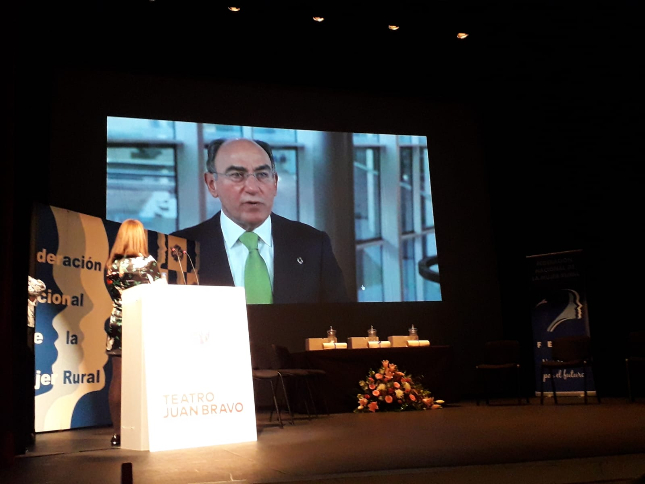
-
01/12/2021Iberdrola and H2 Green Steel sign 2.3 billion euros green hydrogen deal Iberdrola takes another step towards decarbonisation. Iberdrola and H2 Green Steel have signed an agreement to build a green hydrogen plant with an installed capacity of 1,000 MW and an estimated investment of 2.3 billion euros. The new plant will power with clean fuel a direct steel reduction furnace with a capacity to produce around 2 million tonnes per year of pure green steel, with a 95% reduction in CO2 emissions. The site will be located on the Iberian Peninsula, where several possible locations are currently being considered, with the intention of production starting in 2025 or 2026. All locations that H2 Green Steel and Iberdrola are evaluating will have access to renewable energy, as well as all the infrastructure necessary to operate a successful hydrogen, green steel business. "We are proud and delighted to partner with Iberdrola to scale up green steel manufacturing. Large-scale green hydrogen production will be essential for heavy industry's transition to more sustainable ways of operating. By sharing the common goal of reducing emissions in hard-to-decarbonise industries, starting with steel in Europe, we are taking a truly global and innovative approach to green hydrogen production. Iberdrola brings invaluable experience, technology and know-how, which will enable us to scale up our green steel projects," says Henrik Henriksson, CEO of H2 Green Steel. "Green hydrogen will be a key technology in the decarbonisation of heavy industrial processes, such as steel production. Innovative projects such as this will help accelerate the commercialisation of larger and more sophisticated electrolysers, making green hydrogen more competitive. With access to low-cost renewable energy supplies, and a highly skilled workforce, the Iberian Peninsula can play a key role in Europe taking a global lead in the development of this green technology," says Aitor Moso, Iberdrola's director of deregulated business. The two companies have agreed to build a green hydrogen plant with an electrolysis capacity of 1 GW and a steel ore reduction process capable of producing approximately 2 million tonnes of green steel ore per year. The electrolyser will be jointly operated by Iberdrola and H2 Green Steel. Iberdrola will supply renewable energy to the plant, while the production of green molten steel and all downstream metallurgical processes will be operated and owned by H2 Green Steel. Both companies will also explore the possibility of locating a steelmaking facility capable of producing between 2.5 and 5 million tonnes of green steel plate per year on the same site. "The project in Boden in northern Sweden has shown that there is a strong demand for green steel from a broad customer base. The collaboration with Iberdrola will strengthen and refine our Boden platform, infrastructure and project execution. With two European locations, we will make an even greater impact, be closer to customers and be able to meet the demand of a growing market. Together with Iberdrola, we are creating a broader European platform for the green hydrogen economy," says Kajsa Ryttberg-Wallgren, EVP Head of Business Unit Hydrogen at H2 Green Steel. The project will be financed through a combination of public funds, green project financing instruments and own funds. With a budget of approximately €2 billion, the large-scale production of green hydrogen will contribute to the transition of heavy industry towards sustainable operations. "The partnership with H2 Green Steel expands the range of partnerships we have around the world to maximise the benefits of green hydrogen. We also work with fertiliser producers, oil refineries, transport providers and even whisky distilleries. The challenge of achieving zero emissions requires both vision and action in many industrial sectors. With the development of green hydrogen, companies continue to demonstrate that they have the necessary ambition," says Millán García-Tola, Iberdrola's Global Head of Hydrogen. The joint venture was created following contacts facilitated by the European CEO Alliance initiative, in which H2 Green Steel and Iberdrola have joined forces with other companies to achieve a zero-carbon future and a more resilient and sustainable Europe. The CEO Alliance supports decarbonisation efforts by identifying potential partnerships, encouraging green investments and deploying projects that advance the development of sustainable economies and societies, in line with the European Green Deal. A sector with growth potential The decarbonisation of the steel production industry is a great growth opportunity for Iberdrola, as it could mean an additional demand of around 5,000 TWh/year, equivalent to almost twice the current electricity generation in Europe, as well as 40 million tonnes of green hydrogen. The company is therefore accelerating the implementation of the entire hydrogen value chain. Ultimately, it is possible to decarbonise steelmaking and there are already several promising alternatives through direct electrification or green hydrogen. With the expected cost reductions from renewables and green hydrogen driven by Iberdrola, green steel could become more competitive, to the benefit of all consumers. READ MORE
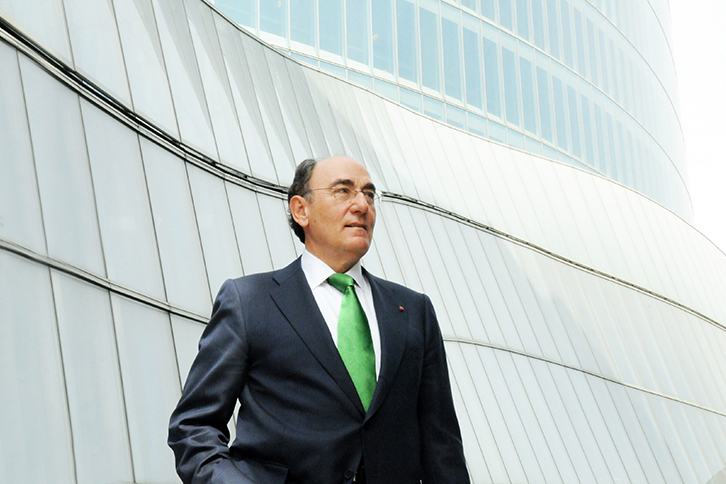
-
30/11/2021Six women sports projects to become a reality thanks to the Iberdrola SuperA awards The chairman of Iberdrola, Ignacio Galán, this afternoon presented the six awards that will be used to finance the winning projects in each of the categories into which the Iberdrola SuperA Awards are divided, an initiative in its second edition and which is part of the company's commitment to promote gender equality and, specifically, to encourage excellence among women through sport. With these awards, Iberdrola will support projects, programmes and initiatives related to women and girls in six categories: Grassroots Sport, Competition, Inclusion, Social Integration, Dissemination and Sustainability, which will each receive a prize of 50,000 euros. The prize in the Iberdrola SuperA Social category went to the Donosti CUP in the World Foundation, from the Basque Country, which aims to organise the Donosti Cup Football Tournament, in which an international team and another Spanish team will participate. For their part, the girls from the Baruca Acrobatic Gymnastics Club of Jaén will be able to compete at a national and international level with the improvements that will be made to their facilities, having won the prize in the Youth Category. In addition, thanks to the Iberdrola SuperA Competition award, the women of the Bolaños sports club in Ciudad Real will have the sports equipment and training necessary to make the leap to professional handball. On the other hand, the SuperA Diffusion award will be used to disseminate the documentary that tells the story of 10 women, Mariburruntzi Sinkro Taldea, who began to practice artistic swimming at the age of 50, reconciling their family, work and sporting life. Valencia will have the first adapted cycling school for women and girls, promoted by Paralympic athlete Ruth Aguilar. The project won the Iberdrola SuperA Inclusion award, while the Royal Spanish Canoeing Federation will be able to establish a national Clean Water Day with the aim of improving the environment where this sport is practised, thanks to the SuperA Sustainability award. All these awards were announced during a gala presented by Sara Escudero, attended by the members of the Jury, Vicente del Bosque, Jesús Carballo, Marta Arce and Teresa Perales; together with the athletes Carolina Marín (badminton), Ona Carbonell (swimming), Sandra Sánchez (karate), Amanda Sampedro (football), Liliana Fernández (volleyball), Teresa Díaz (fencing), Alejandra Querada (gymnastics), Elsa Baquerizo (volleyball), Steffy Navarro (gymnastics), Desirée Vila (adapted athletics), Clara Azurmendi (badminton), María Delgado (for swimming) and Adiaratou Iglesias (for athletics), among others. Iberdrola currently supports 16 federations to which more than 300.000 athletes belong, a commitment that the company intends to expand in the future out of social responsibility and to serve as an incentive for other agents to help raise awareness by also getting involved in promoting women's sport. READ MORE

-
30/11/2021Iberdrola: the world's best energy company for ESG, according to global credit rating agency Standard & Poor’s Iberdrola has, once again, proven it is a trailblazer when it comes to the environment, society and good corporate governance (ESG). According to the global credit rating agency Standard & Poor’s the company led by Ignacio Galan performs better than any other energy company in these areas. Iberdrola scored higher than all the other companies worldwide and tied with Nextera and Orsted. S&P analyses how environmental, social and governance parameters influence the credit rating of each company on a scale from one to five, where one is the best score and five is the worst. The scale is asymmetrical because one means it has a positive influence, two is neutral and anything above three means it has a negative impact. Iberdrola scored one for the environment and governance and two for the social area. According to the credit rating agency, "Iberdrola scored high in terms of the environment because it is one of the world's biggest renewables companies with a portfolio of 37 GW in renewables (13.7 GW hydroelectric) which it will increase to 60 GW by 2025 (14 GW hydroelectric) and 95 GW by 2030 (around 15 GW hydroelectric energy)". The company's low emissions also contributed to its excellent score. "Its emissions are the lowest of the integrated energy companies worldwide, with 98 gCO2/Kwh in 2020, down 11% since 2019", says S&P. The company is making progress to achieving climate neutrality in Europe in 2030 and globally by 2050. A visionary company in the energy transition In terms of governance, S&P says that Iberdrola was one of the "first companies to take advantage of the energy transition". More than 20 years ago, it made its first incursions into the world of renewables and the energy transition to which it has allocated more than 120 billion euros in the last 20 years. The company has also undertaken to invest 150 billion euros by 2030 to stay at the forefront of the energy revolution facing the world's main economies, establishing a business model based on more renewable energies, more networks, more storage and more smart solutions for customers. Another of its strengths is that "management prioritises long-term investment and growth rather than significantly increasing dividends, which we see as a positive for the company's solvency. We are also impressed by management's strategic focus on optimising efficiency in all businesses through digitalisation and automation". S&P also highlights Iberdrola's good position in power grids, which accounted for almost 50% of EBITDA in 2020. The Iberdrola group considers grids to be a key factor both for the electrification of the economy and for the revitalisation of the countries in which the company operates. The company operates one of the world’s largest distribution systems with more than 1.2 million kilometres of distribution and transmission lines, more than 4,400 substations and more than 1.5 million transformers, built and operated to provide a high-quality and reliable service to 32.76 million electricity supply points. READ MORE
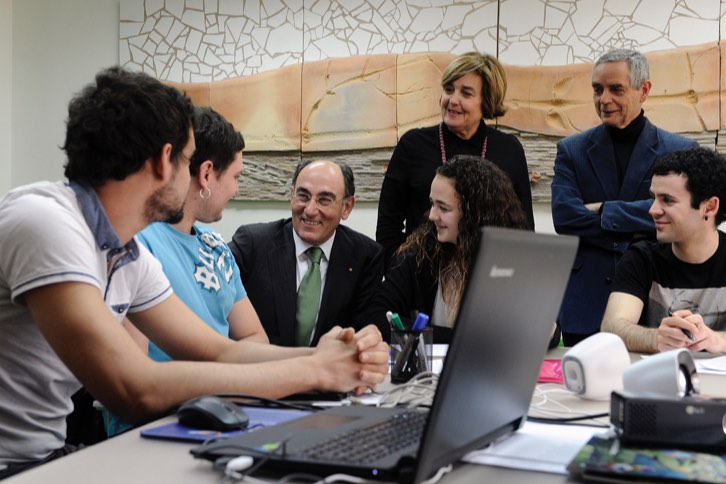
-
29/11/2021Iberdrola Energía Internacional, Iberdrola Clientes Internacional and Iberdrola Renovables Internacional receive AENOR certification for their antibribery and criminal compliance management systems AENOR has certified Iberdrola Energía Internacional, Iberdrola Renovables Internacional and Iberdrola Clientes Internacional in relation to the ISO 37001:2016 (Anti-bribery Management System) standard and UNE 19601:2017 (Criminal Compliance Systems) standard, after verifying that the companies have an effective anti-bribery management system and an effective criminal compliance management system. These international standards set the requirements and provide a guide to establish, implement, maintain, review and improve the mechanisms to combat bribery and prevent criminal activity in companies. The company is therefore reinforcing its compliance with the law and protecting itself against criminal and other liabilities and impacts (sanctions, fines, reputational impact, etc.) that any such illegal conduct may cause. The other Iberdrola group companies in Spain have also been similarly certified. All the group companies are now AENOR certified or undergo equivalent, external reviews of their compliance systems. This is enabling Iberdrola to make further progress with its commitment to best international practices in compliance while reflecting some of its values, such as ethical principles, transparency and good corporate governance. Among the group's corporate governance and regulatory compliance policies are the Crime prevention policy and the Anti-corruption and anti-fraud policy , both of which were approved by the company's Board of Directors in December 2010 and 2016, respectively. The former aims to convey to all Iberdrola executives, employees, and third parties who have dealings with the company, a clear message of opposition to crime, as well as the company's willingness to combat them and to prevent any possible deterioration of its image and reputational value. The latter, on the same line, seeks to convey Iberdrola's firm opposition to fraud and corruption of all kinds, and its will to eradicate it from all its activities. In this context, obtaining certification relating to ISO 37001:2016 and UNE 19601:2017 granted by AENOR is yet more evidence of Iberdrola's commitment to best international practices in the fight against corruption and cements the company's position as a benchmark in these matters. READ MORE
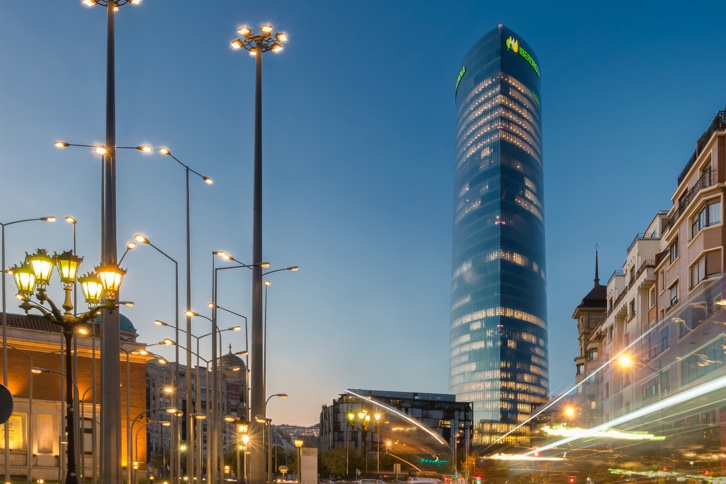
-
29/11/2021Iberdrola, a leader in Corporate Taxation Responsibility Iberdrola leads Corporate Tax Responsibility. This responsibility is based on compliance, transparency and a cooperative relationship based on the immediate future of good tax practices in the international context. This was highlighted in the conference on Corporate Tax Responsibility: compliance, cooperation and corporate transparency, which was held on Monday at the Iberdrola Tower. The conference was organised by the Association for Management Progress (APD) and attended by the heads of tax affairs from important international institutions such as the OECD, the European Union, the regional tax administration, Spanish multinationals and prestigious international consultancy firms. Armando Martínez, general manager of Iberdrola Businesses, talked about the role of Spanish multinational companies as "responsible companies, underlining the role of compliant companies that cooperate with the tax authorities and are transparent in the information they share with all their stakeholders". The energy company's model has become a global benchmark, particularly in recent years, when its pioneering methodology included the social dividend in its governance system, as one of a set of activities that the company carries out to benefit its different stakeholders, and to measure these according to their contribution to each of the United Nations' 17 Sustainable Development Goals. Begoña García-Rozado, global director of taxation at Iberdrola said that “Iberdrola is committed to this fiscal responsibility and prioritises responsible tax behaviour. Tax compliance, cooperation with the tax administrations and transparency as regards our fiscal information are the basis of what we do every day". In tax matters, particularly significant milestones have been achieved in 2021, such as the G-20 agreement to support the taxation mechanism for multinationals agreed by countries and jurisdictions that form part of the so-called 'inclusive framework' of the OECD, which Spain joined last September. This is also an excellent time for revising energy taxation. In this regard, many of these changes are imposed by the digitalisation of the economy and a strong environmental dimension in the industry, which is focused on decarbonisation and promoting renewable and clean energies, under the 'polluter pays' principle. Iberdrola's tax contribution Iberdrola's performance over the last 18 months clearly demonstrates its commitment through the adoption of several measures, such as advancing orders to its suppliers worth almost 20 billion euros, helping its 22,000 suppliers to keep the 400,000 jobs that depend on its projects. Iberdrola's activity has had a very positive impact on the public coffers, to which it has contributed more than 23.5 billion euros in the last three years, representing 44 % of profits allocated to the paying taxes. In 2020 alone, it contributed almost 7.5 million euros globally throughout the group, of which 3.4 million were paid into nationally and 750,000 in the Basque Country. READ MORE
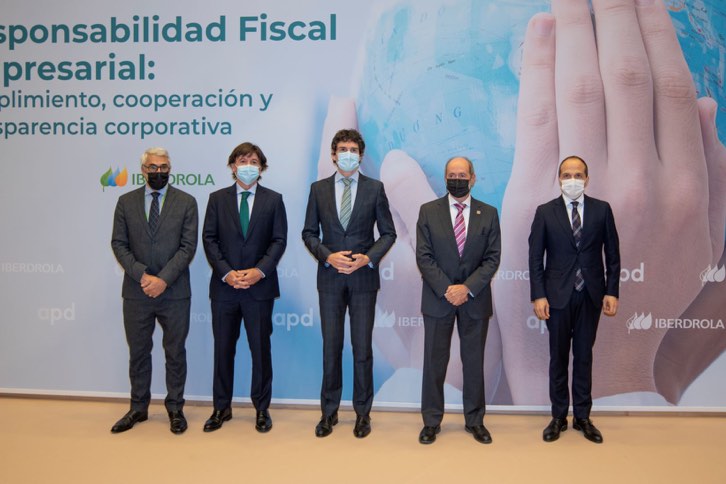
-
24/11/2021Iberdrola is the best renewables company in terms of human rights This is the second consecutive year that Iberdrola has topped the ranking of the world's major renewable energy companies in terms of human rights. The Renewable Energy Companies and Human Rights report, prepared by the Business & Human Rights Resource Centre (BHRRC), assesses the 15 largest listed wind and solar utilities in the world and includes two investors with significant interests in renewable energies (BlackRock and Brookfields). The report addresses subjects including human rights, the right to a clean and healthy environment and community rights, among others. Iberdrola has positioned itself ahead of its competitors in issues such as workers' rights, the right to a clean and healthy environment and community rights. It received a score of 60 % in an industry where the average is 28 % and where more than half of all the companies analysed (9/15) obtained scores below 40 %. Iberdrola has improved by six points compared to last year, clear evidence of the company's determination to make continual improvements to its due diligence system as regards human rights, enabling it to properly identify any potential impact. The report highlights the following positive aspects of the company: * Its public commitment to human rights and to implementing the UN Guiding Principles on Business and Human Rights and the OECD Guidelines for multinationals. * Stakeholder involvement in the development of the human rights focus. * The existence of a due diligence system related to respect for human rights, as a key tool for preventing, mitigating and compensating for impacts. * Iberdrola is the only company with a public and specific commitment to respect the rights of indigenous peoples, in line with international standards (in this case, ILO Convention 169 on Indigenous and Tribal Peoples). * The absence of a gender pay gap The study underlines the urgent need to “mitigate the climate crisis by accelerating the transition to clean energy”, a process that must be sustainable, fast and fair. BHRRC is an NGO with offices in London, New York and Washington that works to promote human rights in business. The study monitors more than 10,000 companies in more than 180 countries and makes the information available to the public in order to help vulnerable people manage potential situations of abuse. READ MORE
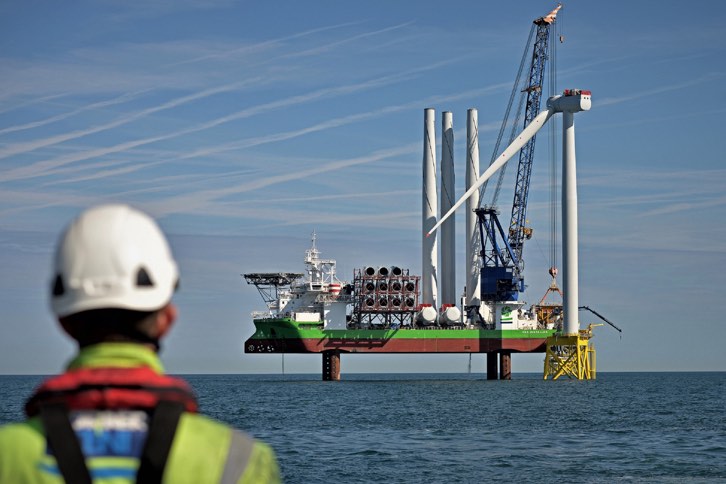
-
22/11/2021King Felipe VI visits the Iberdrola technology centre in Bilbao that will define the electricity grids of the future This morning in Bilbao, King Felipe VI met representatives of companies collaborating in the Global Smart Grids Innovation Hub, a technology hub sponsored by Iberdrola and the Provincial Council of Bizkaia, which is equipped with the latest developments in digitalisation, artificial intelligence and advanced data analytics. A total of 50 companies, technology centres and universities are already working on 120 projects worth 110 million euros at the centre. The innovation centre in Bilbao is one of the company's strategic projects and is working to develop the electricity grids of the future, which will be the cornerstone of the energy transition for all international markets. This public-private collaboration space -with more than 1,000 m2 and located at Iberdrola's network headquarters in Larraskitu- was created to speed up innovation and R&D&i on the real nervous system of decarbonisation: smart grids. The hub is a combination of state-of-the-art technology research, training and entrepreneurship and the latest developments in digitalisation, artificial intelligence and advanced data analytics, among many other fields. King Felipe was interested in the projects, particularly the development of smart grids, their sustainability, efficiency and how they will affect service quality. The chairman of Iberdrola stressed the importance of entrepreneurship and investment to convey a message of commitment and confidence to society. Today, the Iberdrola Tower in Bilbao was the venue chosen for a plenary session of the ERT, an organisation whose members are the main European industrial employers. King Felipe, EC Vice-President Frans Timmermans, ERT Chairman Carl-Henric Svanberg and the chairman, Ignacio Galán, among others, took part in the meeting. King Felipe said that competitiveness and climate objectives are not mutually exclusive. In these times of unprecedented challenges, coordinated action by governments, businesses and citizens is more important than ever. Svanger said that this meeting is an excellent opportunity to share ideas about some of the main economic and social trends at a time when the ecological and digital transformation is gaining speed. During his speech to the ERT, the chairman, Ignacio Galán, explained that decarbonisation is at the centre of the European Strategy and that resources must be invested in the sectors of the future to improve the global competitiveness of the economy and create long-term, high-quality jobs. Spain, the Basque Country and Biscay are excellent examples of the benefits of this transformation. Main features of the Smart Grid Innovation Hub The Global Smart Grids Innovation Hub is a magnet for attracting talent and promoting new technologies that will enable the energy transition, maximise the use of renewables, the full integration of energy storage systems and optimise access to new uses of electricity, such as mobility and heating. Before the official launch, Iberdrola and the Provincial Council of Bizkaia brought together the capacity of 50 industrial companies, universities and technology centres, that contribute their technological capacity, industrial character and research experience. The smart grid innovation hub is also an international collaborative project, bringing together the potential of more than 200 professionals to undertake innovation projects in countries in Europe, America and the Middle East. So far, some 120 projects worth 110 million euros have been identified. Digital solutions, business development and connected worker/secure design The areas of work will provide solutions in new materials and technologies to reduce the environmental impact of electrical installations, equipment to facilitate the integration of renewable energies and boost the deployment of electric vehicles, power electronics and energy storage systems, and the digitalisation of the distribution grid supported by the latest generation of telecommunications systems, such as 5G. It will also promote solutions related to energy savings and efficiency based on demand management or the reduction of losses from the grid. The main areas of innovation for the hub include the digitalisation of the low voltage grid network, the basis for building the smart city of the future. In this regard, the projects focus on developing the next generation of smart meters and on equipment and the grid to provide data and intelligence. Work will also be undertaken on new smart and sustainable substations to replace the current control cable 'bundles' with shared data 'buses', using solutions based on the concept of the 'internet of things'. The Global Smart Grids Innovation Hub will promote knowledge transfer through scholarships and postgraduate courses; it will serve as a catalyst for business development through startup incubation and acceleration programmes; and it will activate competitive intelligence actions, such as designing global conferences. Another focus for action will revolve around the connected worker and the robotisation of operations, in order to make use of equipment incorporating sensors to receive real-time information about risks. In addition, it will use ground and aerial robots (drones) to perform operations remotely, avoiding travel and working more safely and efficiently. The Global Smart Grids Innovation Hub is connected to the Biscay Startup Bay strategy, which will also become a scaleup centre for energy sector start-ups installed in the Torre Bizkaia. Investments to tackle the challenges of the green economy Iberdrola has been leading the energy transition for two decades, acting as a key driving force behind the transformation of the industrial fabric and the green recovery of the economy and employment. The company has thus launched a historic investment plan worth 150 billion euros over the next decade, 75 billion euros by 2025, to triple its renewable capacity and double network assets and take advantage of the opportunities offered by the energy revolution that the world's leading economies are facing. Almost half of this volume of investment has been allocated to electricity grid activities, in order to give continuity to its rollout, establish a solid distribution network and make it flexible based on an ambitious digitalisation project as a key element to meet future needs for electricity. Iberdrola already operates one of the largest electricity distribution grids in the world; more than 1.2 million kilometres of electricity transport and distribution lines and more than 4,400 substations, which carry electricity to more than 34 million people across the world. By 2025, regulated assets will reach €47 bn, mainly located in A Rating countries, By 2030, the company expects to have doubled its regulated network assets to €60 bn. READ MORE
